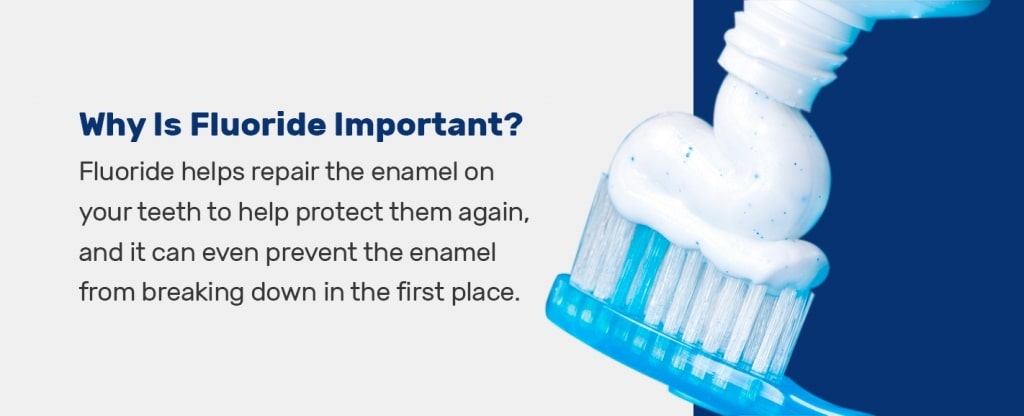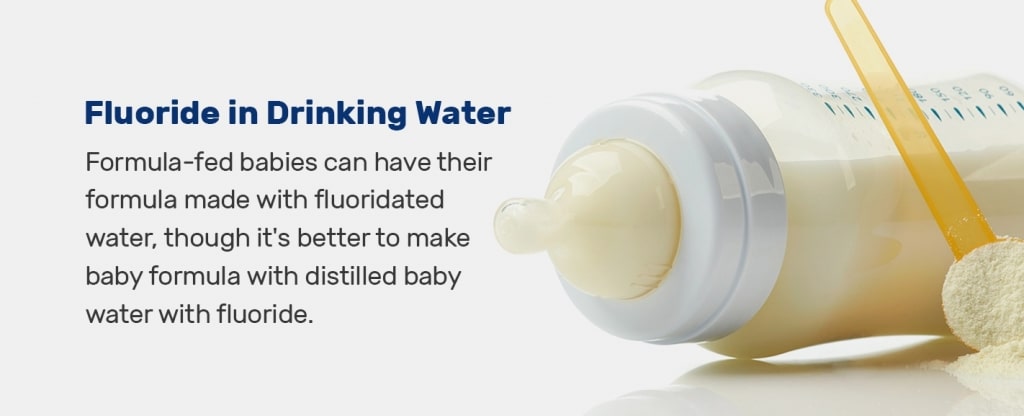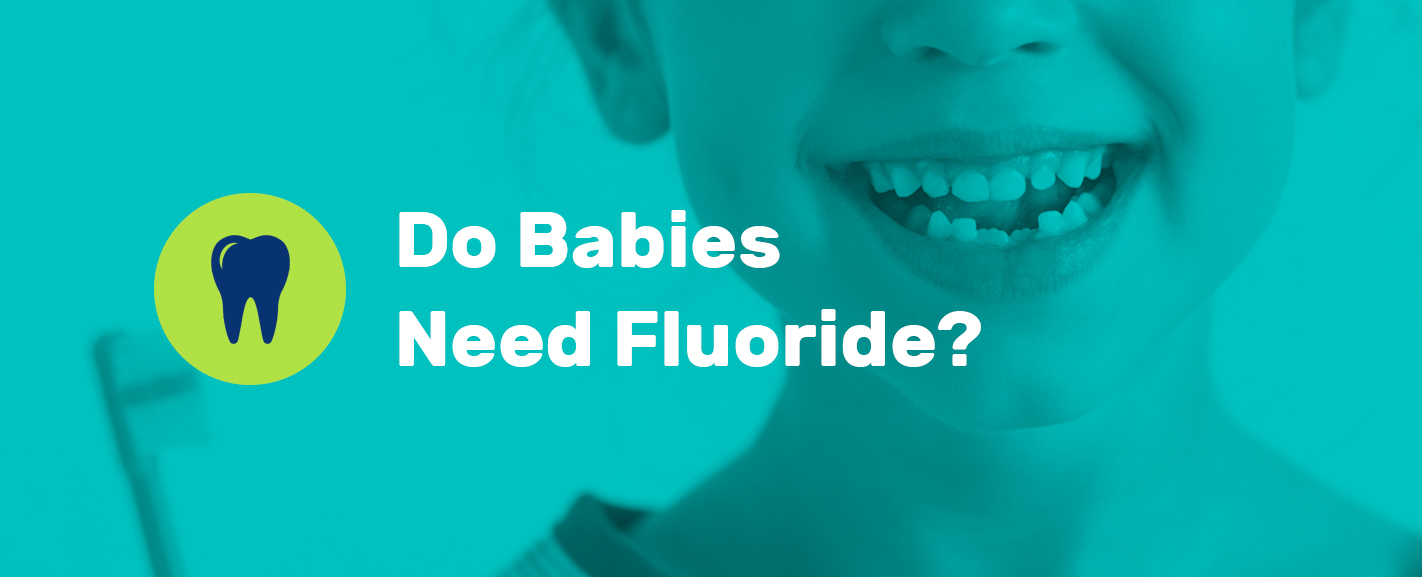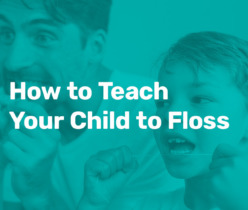People have debated the effects of fluoride for years, but like with anything controversial that could affect your health, there is a lot of misinformation floating around about what fluoride is, what it does, and why it can be important (or harmful) for human health.
When it comes to children’s health, the topic becomes even more heated. Especially since what dental professionals consider to be healthy and recommended for older kids and adults is not always the same for babies and toddlers. The fluoride vs. no fluoride debate shows no signs of stopping, but some basic facts are worth knowing when it comes to making decisions about fluoride and kids.
What Is Fluoride?
Fluoride is a mineral that occurs naturally in things like air, water, plants and rocks. While it can occur naturally, it can also be added to things like drinking water and toothpaste. Because fluoride helps prevent tooth decay in humans, many dental products like toothpaste and mouthwash boast this element among their ingredients.
While a certain amount of fluoride is beneficial and even necessary for the dental health of all humans, babies and very young children don’t need as much fluoride as older kids and adults.
Why Is Fluoride Important?

Fluoride is mainly used to improve human dental health. When we eat food, there are bacteria in our mouths that help break the sugars and carbs down. When they break down these foods, they create an acid that can destroy the protective layer of our teeth, called the enamel.
Weakened enamel endangers the structural integrity of your teeth and makes your teeth vulnerable to harmful bacteria that cause cavities.
Fluoride helps repair the enamel on your teeth, and it can even prevent the enamel from breaking down in the first place. Fluoride penetrates the crystalline structure of enamel, creating a stronger, more dense enamel shell compared to enamel with no fluoride exposure. The effects of fluoride on dental health is why many kinds of toothpaste and mouth rinses tend to have fluoride added to them.
Experts consider it to be one of the best ways to prevent and repair tooth decay in humans. It also helps make sure kids have healthier teeth. From the 1960s through the 1990s, the addition of fluoride in drinking water and dental products reduced the number of 12-year-old kids with missing or decaying teeth by 68%.
Is Fluoride Good for Children
Children older than 6 months can benefit from fluoride— both topical and systemic— because it will help protect their first set of baby teeth and prevent their future adult teeth from decaying by helping build healthy enamel.
Because of an inability to properly spit, babies and young children tend to swallow toothpaste when having their teeth brushed. A small amount of fluoride toothpaste or mouth rinse is okay to swallow, swallowing too much could be dangerous. Therefore, kids who are unable to properly spit should have adult supervision when dispensing toothpaste and brushing their teeth.
Do Babies Need Fluoride?
Babies younger than 6 months old generally do not need any fluoride at all. At a baby’s 6-month checkup with a pediatrician, parents can discuss fluoride supplements or fluoride drops for babies. As soon as babies get their first teeth, parents should begin brushing with a fluoride toothpaste to cash in on the topical benefits of fluoride.
You should start introducing fluoride for babies as the teeth come in by brushing with a dab or a smear — no bigger than the size of a grain of rice — of toothpaste with fluoride. You do not necessarily need to use a “baby toothpaste.” Any over the counter version of fluoride toothpaste will suffice.
Is Fluoride Bad for Babies?
A little fluoride for babies isn’t bad, but as with most things, too much fluoride can be. While babies and children need less fluoride than adults, very small doses of fluoride aren’t harmful to babies younger than 6 months old.
Once babies’ teeth begin to come in, the addition of dental hygiene practices, with fluoride toothpaste, will help protect the new teeth. Make sure to only use a dab of toothpaste no bigger than the size of a grain of rice for babies, as they are apt to swallow the toothpaste.
Babies should have their first dental appointment by their first birthday, and a pediatric dentist can advise you on how to best get your little one on the right track to proper dental hygiene.
How Do Children Get Fluoride?
There are two main ways in which everyone gets fluoride to encourage dental health: through drinking water and dental supplies. Getting fluoride from both sources is best as it provides the right amount of fluoride needed to maintain healthy teeth. If there is insufficient fluoride in your local drinking water, your pediatrician or pediatric dentist may recommend or prescribe a fluoride supplement depending on your child’s overall cavity risk.
Ensuring children eat a healthy, balanced diet full of calcium and vitamin D is another excellent way to ensure they get an adequate amount of fluoride.
Fluoride in Drinking Water

Most communities in the United States already have fluoride in the water supply, either naturally or added in. The fluoride in drinking water is highly controlled, so you are not at risk of overexposure to fluoride by just drinking a normal amount of water a day.
If your water supply comes from a well, you may need to check to see if it is fluoridated and, if so, how much. The United States has a limit on the amount of fluoride water can contain, so make sure your water supply doesn’t exceed it.
Formula-fed babies can have their formula made with fluoridated water, though it’s better to make baby formula with distilled baby water with fluoride. Bottled fluoridated water is also an excellent option for parents in cities like Portland, where the water supply is not fluoridated. However, it is recommended that you consult with your pediatric dentist to determine which type of water is best used to mix formula.
Fluoride for babies’ teeth is crucial to ensuring good dental health, so if your water doesn’t have fluoride in it, check with your dentist to see if your baby needs supplements like fluoride drops for babies.
Fluoride in Dental Supplies
Over the counter oral hygiene products, like toothpaste and mouth rinse, are another way to ensure children and adults get the proper amount of fluoride to keep their teeth clean. Using fluoridated dental supplies in addition to fluoridated water is perfectly safe and acceptable.
Fluoride varnish is another version of fluoride applied at most routine dental cleaning visits. It is painted on the teeth and allows a high topical uptake of fluoride to the enamel. It is the standard of care for children to apply topical fluoride varnish 2-4 times per year depending on your child’s overall cavity risk.
Silver diamine fluoride is another anti-cavity spot treatment that helps to arrest and reverse cavities, and some dental filling materials and cements used for crowns contain fluoride as well.
Risks of Fluoride
Like with anything in the world, too much fluoride can be harmful, and in extreme instances of overexposure (for example, consuming multiple tubes of toothpaste in a single session), even deadly. Systemic toxicity is rare when children are properly supervised.
The most common trend resulting in too much systemic fluoride can cause discoloration or pitting to permanent teeth. The risks of overexposure are especially high for children under the age of 8 because their permanent teeth are still developing. Too much fluoride can cause enamel fluorosis, which results in discoloration of the enamel of a child’s adult teeth.
Most cases of enamel fluorosis are mild and occur as a result of a child ingesting too much toothpaste or mouthwash. Too much fluoride in a child’s body can also result in their feeling ill — with symptoms like nausea and diarrhea — which can last for up to 24 hours.
Overexposure to fluoride is very preventable, though, with the easiest way being to keep toothpaste and mouthwashes out of reach of small children.
Is Fluoride Treatment Right for Your Child?
At Sprout Pediatric Dentistry and Orthodontics, we’re parents as well as dental professionals ourselves, so we know how important oral care is for babies and kids. We provide compassionate care to ensure your baby’s first dental visit will be a positive one.
If you’re concerned about your baby’s fluoride intake, talk with us at Sprout Pediatric Dentistry and Orthodontics to see which treatment is best for your child. Treatments we offer include fluoride supplements (drops or chewable tablets), as well as topical treatments — and we want to ensure you are well-informed before making any decisions.
Get in touch to request an appointment today.

Dr. Dana grew up in Portland and went to Temple University in Philadelphia, PA for dental school. She then moved to Anchorage, AK for her residency in Pediatric Dentistry. Dr. Dana takes a holistic approach to pediatric dentistry & is able to use her own parenting experience to sympathize and understand each family’s unique dynamic.



